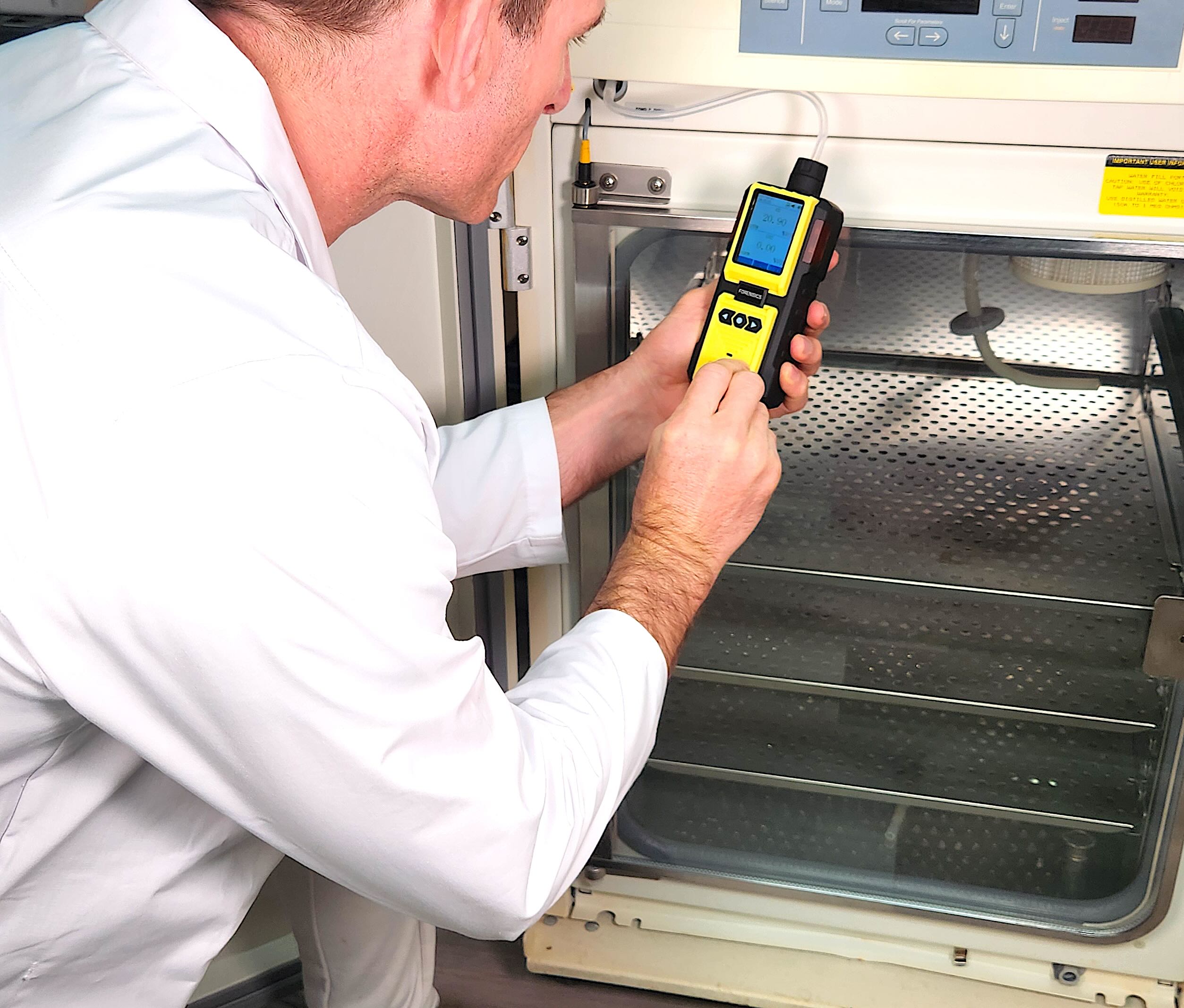CO2 gas detection is important for biological incubators. Also known as CO2 incubators or CO2 biological incubators, CO2 gas monitors help optimize cell culture growth. The Incubator CO2 Monitor, a vital component of these instruments, measures the concentration of carbon dioxide gas within the incubator in %vol, typically set at 5% CO2. Accurate gas detection ensures that the ideal environment is maintained for the growth of cell cultures and other microorganisms. This carbon dioxide meter is commonly used in biological research labs requiring precise control over incubator conditions. By monitoring and adjusting CO2 levels, researchers can achieve optimal cell growth, leading to more reliable experimental results.
Pros |
Cons |
|
✅ Incubator CO2 Monitor for biological incubators are useful tools to accurately measure carbon dioxide concentration within incubators. ✅ Incubator CO2 Monitors for biological incubators are less than $1000. ✅ A Incubator CO2 Monitor for ensures correct amount of carbon dioxide is present in the incubator even if the incubator’s calibration system is not working properly. |
⛔ The upfront costs of the biological incubator and the CO2 meter can be expensive. ⛔ Older models may require more frequent calibration. ⛔ Some biological incubators have built-in carbon dioxide monitors inside of them and thus do not necessarily need an additional CO2 meter for biological incubators. |
What is the Best Incubator CO2 Monitor?
The best CO2 monitor for biological incubators is a unit with a CO2 range from 0 to 10%. This range provides the most accurate measurement for most incubators that require CO2 to remain at about 5%.
- Forensic Detectors CO2 and O2 for Incubators
- Via Sensor
- CO2 Meter CO2 Monitor
- Edaphic Scientific
- Bacharach CO2 Analyzer
Which CO2 gas monitor shall I Purchase?
- If your incubator has a sample air port, then you need the FD-600-CO2-O2-INC. This analyzer has a built in pump and will draw the air from the incubator to the analyzer. This is the ultimate and best most accurate way to test.
- If your incubator does NOT have a sample air port, but does have a glass window door, you can use the FD-90A-CO2 (10%), and place the CO2 monitor in the incubator. Versatile, but not as accurate as using the FD-600-CO2-O2-INC as explained in step 1.
- If your incubator does NOT have a sample air port, and does NOT have a glass door window then you will need to engineer access to the incubator and use the FD-600-CO2-O2-INC so the analyzer can draw the air from the incubator to the analyzer for gas analysis.

What is the Purpose of a CO2 Incubator?
In incubators, CO2 serves the important purpose of maintaining the pH present in the incubator to allow for optimal cell growth. Combined with proper humidity and temperature, the controlled presence of CO2 in the incubator allows for key, non-contaminated cell growth.
How Do You Measure CO2 Levels in an Incubator?
In an incubator, CO2 levels are measured using a carbon dioxide meter, sometimes referred to as a carbon dioxide analyzer or carbon dioxide monitor. Such meters come in two different forms of gas sensors: a thermal conductivity sensor (T/C) or an infrared (IR) sensor. Thermal conductivity sensors monitor how well heat transfers through a gas while infrared sensors monitor infrared radiation in the given environment.
Why is CO2 Used in Incubators?
CO2 is used in incubators in order to maintain a consistent pH level. This consistent pH then allows for effective cell growth.
Chemically, CO2 helps to maintain a consistent pH level by reacting with water to produce carbonic acid. This carbonic acid then reacts with the bicarbonate ions to produce sodium bicarbonate or bicarbonate. It is this product that assists in maintaining the pH.

What is the Difference Between an Incubator and a CO2 Incubator?
A standard incubator in a biological lab is often referred to as a microbiology incubator. It differs from a CO2 incubator in that it focuses on maintaining a consistent temperature for cell growth while CO2 incubators often maintain the temperature in addition to maintaining the pH of the environment and, as a result, the subsequent culture.
Is There Oxygen in a CO2 Incubator?
Oxygen can be found in a CO2 incubator since many cells require oxygen to survive. This can be a limitation of the devices in some cases, however, in the case of anaerobic bacteria that do not grow in environments where oxygen is present.
How Much Does a CO2 Incubator Cost?
CO2 incubators themselves have a wide range of costs. At the low end, some are about $3,000, while at the high end, some are about $20,000. Many factors contribute to this wide range including what features are available and what maintenance the seller is willing to offer.
What is the Purpose of Using 5% CO2 in the Incubator?
5% CO2 is used in biological incubators in order to ensure the correct, constant pH is maintained. The CO2 serves to create bicarbonate that acts as a buffer and keeps the pH level maintained. As such, if a researcher wants to maintain a pH level of 7.2-7.4, as is typical for normal tissues since it is near neutral, he or she must calculate the amount of bicarbonate necessary for this pH and adjust the percentage of CO2 accordingly. Most cell cultures will maintain the correct pH when the CO2 meter tracks a CO2 concentration between 4.5% and 6.5%, with 5% being the common measurement used.
- It is important to obtain a CO2 meter with %vol range. Typically ppm indoor air quality CO2 meters will not work since their range is too small.
- Depending on your setup, you may require a CO2 meter with a built in pump or with no pump, and operating diffusively.
What is the Temperature of a CO2 Incubator?
CO2 incubators do not have a set temperature. Rather, the user can adjust the temperature to what they deem is best for optimal cell growth. For human iPS cells, this is 37 ºC but the ideal temperature should be adjusted for other cell types if they grow best in different temperatures.
What is the Function of CO2 in a CO2 Incubator?
The general function of CO2 in a CO2 incubator is to provide ideal growing conditions for the cell cultures and microorganisms being grown. More specifically, the CO2 serves to balance the pH levels in the incubator.
How Long Can Cells Survive Outside of an Incubator?
The total length of survival for cells outside of the incubator ultimately depends on the type of cells used—some cells can survive much longer than others outside of the incubator. One of the largest concerns for cell survival outside of the incubator is not actually the presence of CO2, rather it is the temperature of the environment in which the cells reside.
How Accurate are CO2 Meters?
CO2 Meters are accurate but one must check the specifications of the product.
As temperature and humidity increase or decrease, the accuracy will vary. Typical accuracy for CO2 meters is about 5% of the full range. But again, this is worst case scenario when termperature and humidity are approaching the maximum permitted. Typically, however, under normal operating conditions a CO2 for incubators should read within 0.3% of the CO2 real value.
What is the Principle of an Incubator?
The basic principle behind the use of an incubator is that microorganisms, which are the cells that will be grown within the incubator, depend upon specific features within their environment for their growth and reproduction. As such, incubators serve to regulate temperature, oxygen levels, carbon dioxide levels, pH levels, and humidity in order to better allow the cells to develop.
What CO2 Concentration is Normally Set for a Mammalian Cell Culture Incubator?
Most mammalian cell culture incubators will have CO2 concentration set to 5%, but researchers should take care to evaluate their own cell’s growth conditions and adjust the CO2 levels accordingly.
What are the Types of Incubators?
Incubators come in three forms:
- Poultry incubators function to keep eggs from fertilized birds warm until hatching.
- Infant incubators function to keep babies warm when they are unable to properly regulate their own temperature and/or are born prematurely.
- Biological incubators promote the growth of cell cultures and microorganisms by maintaining an optimal environment for the specific microorganism being grown.
Why Do We Place Cells in an Incubator with 5% CO2?
5% CO2 is used in the incubation of cell culture in order to maintain an adequate pH to foster cell growth. In the environment, the CO2 acts as a bicarbonate buffer and also provides some nutrients to the growing cells.
How Does a Laboratory Incubator Work?
By definition, a laboratory incubator is a piece of scientific equipment that is both heated and sealed and used to control an environment conducive to microbiological growth conditions. It does this through monitoring and maintaining temperature, humidity, and gas concentration.
What is a Humid CO2 Incubator?
CO2 incubators are used to maintain a high humidity over time for cell growth that is typically between 95% and 98%.
FUN FACT - Did you know?
CO2 regulation during the early or late period of incubation is beneficial for embryonic development, hatching characteristics, and chick quality. In addition, this effect is likely mediated by changes in hormones and nutrients.
What is the Importance of an Incubator in a Biological Laboratory?
Incubators are an essential part of biological laboratory equipment that allows for the growth of cell cultures in a constant, set environment conducive to the optimum growth of cells.
What Type of CO2 is Used in Incubators?
In biological incubators, CO2 is set to the desired concentration, often 5%, and tracked using a CO2 meter for biological incubators. This may not be the same for the other types of incubators, poultry and infant. If you are operating an incubator with elevated CO2, you will need a 0-100% CO2 monitor.
Is Carbon Dioxide Dangerous?
Exposure to high levels of carbon dioxide can be dangerous. In fact, increasing levels of carbon dioxide is a large concern for climate change. In the biological incubator, however, short exposure should not cause long-lasting damage to users assuming adequate ventilation is present.
Can You Detect An Odor From CO2 Used In Biological Incubation Systems?
No, carbon dioxide used in biological incubators is odorless. If you detect any smell, it may indicate contamination or system malfunction requiring immediate investigation.
Final Words
Gas detection is essential in biological incubators, where CO2 meters play a crucial role in maintaining optimal conditions for cell growth. Also known as carbon dioxide monitors, analyzers, or detectors, these instruments accurately measure the CO2 concentration within the incubator. By maintaining the ideal CO2 levels, typically around 5%, researchers can create the perfect environment for cell cultures to thrive. CO2 meters are widely used in various biological laboratories, including government, private, and academic facilities. Precise gas detection ensures that experiments involving cell growth are conducted under consistent and reliable conditions, ultimately contributing to the success of research in fields such as medicine, biotechnology, and life sciences.
About The AuthorDr. Kos Galatsis ("Dr.Koz") is the President of FORENSICS DETECTORS, where the company operates from the scenic Palos Verdes Peninsula in Los Angeles, California. He is a subject matter expert on gas sensor technology, gas detectors, gas meters, and gas analyzers. He has been designing, building, manufacturing and testing toxic gas detection systems for over 20 years. 
Every day is a blessing for Dr. Koz. He loves to help customers solve their unique problems. Dr. Koz also loves spending time with his wife and his three children going to the beach, grilling burgers, and enjoying the outdoors. Read more about Forensics Detectors here. Email: drkoz@forensicsdetectors.com |

